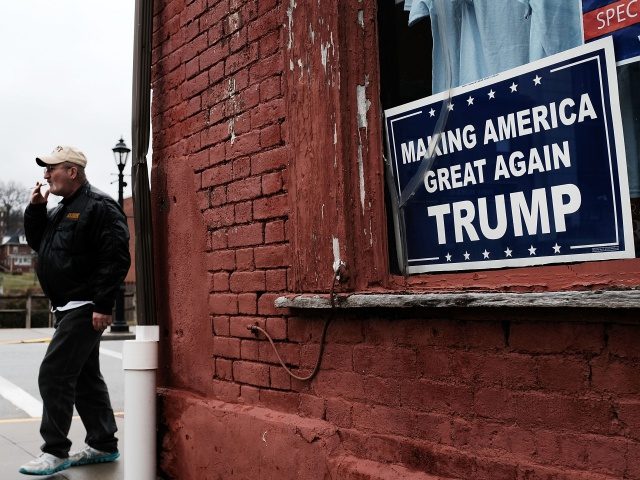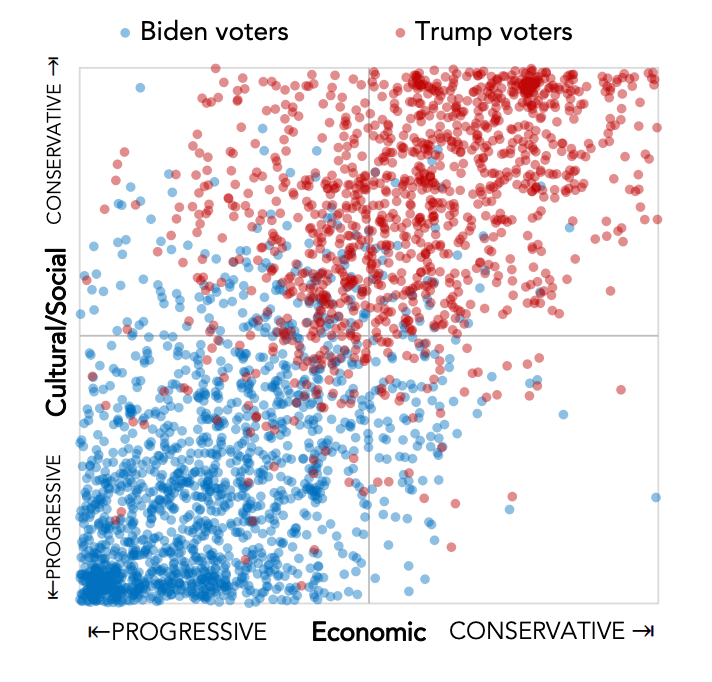Democrats lost significant support in small-to-medium cities and towns in the Midwest which have been gutted by the decades-long globalization of the American economy.
The analysis called “Factory Towns” by Democrat strategists, partially detailed in the New York Times before its release, reveals the extent to which America’s working- and middle-class communities in the heartland of the nation have drifted from the Democrat Party.
“The share of the Democratic presidential vote in the Midwest declined most precipitously between 2012 and 2020 in counties that experienced the steepest losses in manufacturing and union jobs and saw declines in health care,” the Times reports.
Specifically, the analysis surveyed the Great Lakes region, Missouri, and Iowa — referring to them as “factory towns” for the analysis because they tend to rely on American manufacturing to provide jobs and health care to residents.
Altogether, the ten states analyzed have lost nearly two million manufacturing jobs due to globalization and free trade since the year 2000. More than 70 percent of the factory towns in those states lost manufacturing jobs over the same period.
The results found that between 2012 and 2020, Democrats lost roughly 557,000 voters in rural counties while gaining about 1.6 million votes in the region’s big cities and suburbs.
The losses are most profound in the factory towns of the region where Democrats lost 2.63 million votes between former President Barack Obama’s reelection in 2012 and President Joe Biden’s victory in 2020 against former President Donald Trump.

People listen to Senator Joe Manchin (D-WV) speak with coal miners at a Town Hall meeting on March 31, 2017, in Matewan, West Virginia. (Bill Pugliano/Getty Images)
“If things continue to get worse for us in small and midsize, working-class counties, we can give up any hope of winning the battleground states of the industrial heartland,” one of the authors of the analysis writes, according to the Times.
Meanwhile, Republicans surged with support in factory towns. The analysis found that almost half of Republican gains in the ten states reviewed had come from factory towns that have suffered joblessness and a lack of health care as a result.
Those Republican gains were even more pronounced among white working-class communities and regions that have seen dramatic union membership decline as globalization has outsourced and offshored American industries to foreign countries.
The Times reports:
Republicans also prospered in communities hit hard by the decline in manufacturing that were predominantly white. With fewer well-paying industry jobs, the power of local unions declined as well, silencing what was always the beating heart of Democratic political organizing in these areas. In 154 such counties, Democrats suffered a net loss of over 613,000 votes between the elections in 2016 and 2020. [Emphasis added]
…
Nine of the 10 states included in the survey have accounted for 93 percent of the loss of union members nationwide in the last two decades. And just in the last 10 years, these states have lost 10 percent of their union membership — an average that is three times greater than nationally. [Emphasis added]
The analysis gives major insight to Republicans as to how they can retain working- and middle-class voters in factory towns where globalization, free trade, mass immigration, and concentrated corporate wealth along the coasts have made their communities poorer.
Following Trump’s loss in the 2020 election, for instance, an Echelon Insights survey of Republican voters found that 72 percent said they want the GOP to stick with Trump’s economic nationalist agenda that focused heavily on reshoring jobs, providing cheap health care to Americans, increasing wages by decreasing immigration, and cracking down on corporations’ outsourcing schemes.
Just 16 percent of Republican voters in 2020 said they want the GOP to return to the party of globalization and corporatization — with leaders like former President George W. Bush or Mitt Romney.
Also after the 2020 election, an analysis by Navigator underscored that while Republican voters remain mostly culturally conservative, they lean towards the middle of the ideological spectrum on key economic questions — making them economic populists.
The GOP’s leaning into libertarian policy initiatives, research has shown, remains its largest weakness because so few in the electorate consider themselves economically conservative and socially liberal.
Those that do fall into the libertarian quadrant actually favored Biden more than Trump, whereas economic liberals who are socially conservative favored Trump over Biden.
With specific issues, economic nationalism unites broad support across the political spectrum which could be a boon for Republicans willing to defend working- and middle-class interests over corporate power interests.
A survey from May 2020 found that 66 percent of Americans support increasing tariffs on foreign imports, while just 34 percent said the U.S. should impose more free trade with foreign countries.
Even when Americans were told that they may have to pay more for American-made products, 76 percent said they would be willing to do so in order to reshore vital American industries. Only 24 percent said they would not be willing to pay more.
The most support came for mandatory country-of-origin labeling so that consumers are fully aware of where products are made and imported from.
About 94 percent of Americans said they support requiring labels on each product that indicate all of the countries where the product was designed, manufactured, and assembled as well as indicate what percentage of the product was made in each country. Only six percent oppose such a requirement.
John Binder is a reporter for Breitbart News. Email him at jbinder@breitbart.com. Follow him on Twitter here.


COMMENTS
Please let us know if you're having issues with commenting.